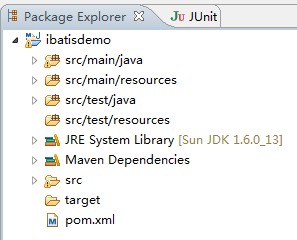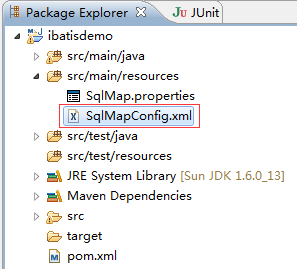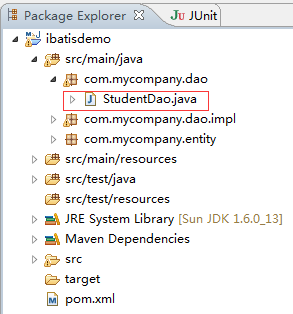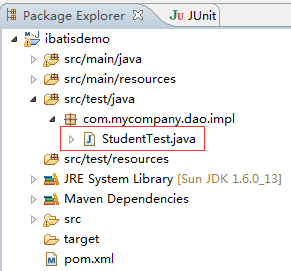IBatis增删改查
Posted
tags:
篇首语:本文由小常识网(cha138.com)小编为大家整理,主要介绍了IBatis增删改查相关的知识,希望对你有一定的参考价值。
1.创建Maven项目,项目名称ibatisdemo,目录结构如图所示
2.pom.xml文件中的内容如下
<project xmlns="http://maven.apache.org/POM/4.0.0" xmlns:xsi=" xsi:schemaLocation="http://maven.apache.org/POM/4.0.0 http://maven.apache.org/xsd/maven-4.0.0.xsd"> <modelVersion>4.0.0</modelVersion> <groupId>com.mycompany</groupId> <artifactId>ibatisdemo</artifactId> <version>0.0.1-SNAPSHOT</version> <build/> <dependencies> <!-- https://mvnrepository.com/artifact/org.apache.ibatis/ibatis-sqlmap --> <dependency> <groupId>org.apache.ibatis</groupId> <artifactId>ibatis-sqlmap</artifactId> <version>2.3.0</version> </dependency> <!-- https://mvnrepository.com/artifact/mysql/mysql-connector-java --> <dependency> <groupId>mysql</groupId> <artifactId>mysql-connector-java</artifactId> <version>5.1.38</version> </dependency> </dependencies> </project>
3.在src/main/java下创建实体类Student,包名(com.mycompany.entity)
4.实体类Student的内容如下
package com.mycompany.entity;
public class Student {
private int sid;
private String name;
public int getSid() {
return sid;
}
public void setSid(int sid) {
this.sid = sid;
}
public String getName() {
return name;
}
public void setName(String name) {
this.name = name;
}
public String toString(){
return "id="+sid + "name="+name;
}
}5.创建实体类Student的配置文件Student.xml,如图所示
6.Student.xml的内容如下
<?xml version="1.0" encoding="UTF-8"?> <!DOCTYPE sqlMap PUBLIC "-//ibatis.apache.org//DTD SQL Map 2.0//EN" "http://ibatis.apache.org/dtd/sql-map-2.dtd"> <sqlMap> <!-- 定义别名为Student --> <typeAlias alias="Student" type="com.mycompany.entity.Student"/> <!-- id:表示唯一标识名,resultClass:表示返回结果的类型 --> <select id="selectAllStudent" resultClass="Student"> SELECT * FROM student </select> <!-- 根据ID查询学生信息 --> <select id="selectStudentById" parameterClass="int" resultClass="Student"> SELECT * FROM student WHERE sid=#sid# </select> <!-- 根据名称模糊查询 --> <select id="selectStudentByName" parameterClass="String" resultClass="Student"> SELECT sid,name FROM student WHERE name LIKE ‘%$name$%‘ </select> <!-- 添加学生信息 --> <insert id="addStudent" parameterClass="Student"> INSERT INTO student(name) VALUES(#name#) <selectKey resultClass="int" keyProperty="sid"> select LAST_INSERT_ID() AS sid </selectKey> </insert> <!-- 删除学生信息 --> <delete id="deleteStudentById" parameterClass="int"> DELETE FROM student WHERE sid=#sid# </delete> <!-- 修改学生信息 --> <update id="updateStudent" parameterClass="Student"> UPDATE student SET name=#name# WHERE sid = #sid# </update> </sqlMap>
7.在src/main/resources下创建属性文件SqlMap.properties,如图所示
8.SqlMap.properties的内容如下
driver=com.mysql.jdbc.Driver url=jdbc:mysql://localhost:3306/test username=root password=
9.在src/main/resources下创建配置文件SqlMapConfig.xml,如图所示
10.配置文件SqlMapConfig.xml的内容如下
<?xml version="1.0" encoding="UTF-8"?>
<!DOCTYPE sqlMapConfig PUBLIC "-//ibatis.apache.org//DTD SQL Map Config 2.0//EN"
"http://ibatis.apache.org/dtd/sql-map-config-2.dtd">
<sqlMapConfig>
<properties resource="SqlMap.properties"/>
<transactionManager type="JDBC">
<dataSource type="simple">
<property name="JDBC.Driver" value="${driver}"/>
<property name="JDBC.ConnectionURL" value="${url}"/>
<property name="JDBC.Username" value="${username}"/>
<property name="JDBC.Password" value="${password}"/>
</dataSource>
</transactionManager>
<sqlMap resource="com/mycompany/entity/Student.xml"/>
</sqlMapConfig>11.在src/main/java下创建接口StudentDao,包名(com.mycompany.dao)如图所示
12.接口StudentDao的内容如下
package com.mycompany.dao;
import java.util.List;
import com.mycompany.entity.Student;
public interface StudentDao {
/**
* 查询全部学生信息
*
* @return 返回学生列表
*/
public List<Student> selectAllStudent();
/**
* 根据学生ID查询学生信息
* @param sid
* @return 学生对象
*/
public Student selectStudentById(int sid);
/**
* 根据名称模糊查询
* @param name
* @return 学生列表
*/
public List<Student> selectStudentByName(String name);
/**
* 添加学生信息
* @param student
* @return 是否添加成功
*/
public boolean addStudent(Student student);
/**
* 根据ID删除学生信息
* @param sid
* @return 删除是否成功
*/
public boolean deleteStudentById(int sid);
/**
* 修改学生信息
* @param student
* @return
*/
public boolean updateStudent(Student student);
}13.在src/main/java下创建StudentDao的实现类StudentDaoImpl,包名(com.mycompany.dao.impl),如图所示
14.StudentDao的实现类StudentDaoImpl的内容如下
package com.mycompany.dao.impl;
import java.io.IOException;
import java.io.Reader;
import java.sql.SQLException;
import java.util.List;
import com.ibatis.common.resources.Resources;
import com.ibatis.sqlmap.client.SqlMapClient;
import com.ibatis.sqlmap.client.SqlMapClientBuilder;
import com.mycompany.dao.StudentDao;
import com.mycompany.entity.Student;
public class StudentDaoImpl implements StudentDao {
private static SqlMapClient sqlMapClient = null;
static{
try {
Reader reader = Resources.getResourceAsReader("SqlMapConfig.xml");
sqlMapClient = SqlMapClientBuilder.buildSqlMapClient(reader);
reader.close();
} catch (IOException e) {
e.printStackTrace();
}
}
/**
* 查询所有学生信息列表
*/
public List<Student> selectAllStudent() {
List<Student> students = null;
try {
students = sqlMapClient.queryForList("selectAllStudent");
} catch (SQLException e) {
e.printStackTrace();
}
return students;
}
/**
* 查询学生对象信息
*/
public Student selectStudentById(int sid) {
Student student = null;
try {
student = (Student) sqlMapClient.queryForObject("selectStudentById",sid);
} catch (SQLException e) {
e.printStackTrace();
}
return student;
}
/**
* 根据名称查询学生列表
*/
public List<Student> selectStudentByName(String name) {
List<Student> students = null;
try {
students = sqlMapClient.queryForList("selectStudentByName",name);
} catch (SQLException e) {
e.printStackTrace();
}
return students;
}
/**
* 添加学生信息
*/
public boolean addStudent(Student student) {
Object object = null;
boolean flag = false;
try {
object = sqlMapClient.insert("addStudent",student);
} catch (SQLException e) {
e.printStackTrace();
}
if(object != null){
flag = true;
}
return flag;
}
/**
* 根据ID删除学生信息
*/
public boolean deleteStudentById(int sid) {
Object object = null;
boolean flag = false;
try {
object = sqlMapClient.delete("deleteStudentById",sid);
} catch (SQLException e) {
e.printStackTrace();
}
if(object != null){
flag = true;
}
return flag;
}
/**
* 修改学生信息
*/
public boolean updateStudent(Student student) {
Object object = null;
boolean flag = false;
try {
object = sqlMapClient.update("updateStudent",student);
} catch (SQLException e) {
e.printStackTrace();
}
if (object != null) {
flag = true;
}
return flag;
}
}15.在src/test/java下创建测试类StudentTest,包名(com.mycompany.dao.impl),如图所示
16.测试类StudentTest的内容如下
package com.mycompany.dao.impl;
import java.util.List;
import com.mycompany.entity.Student;
public class StudentTest {
/**
* @param args
*/
public static void main(String[] args) {
StudentDaoImpl studentDaoImpl = new StudentDaoImpl();
//查询所有学生信息列表
List<Student> students = studentDaoImpl.selectAllStudent();
for (Student student : students) {
System.out.println(student);
}
//根据学生ID查询学生对象信息
Student student = studentDaoImpl.selectStudentById(2);
System.out.println(student);
//根据学生名称查询学生列表
List<Student> students2 = studentDaoImpl.selectStudentByName("xiao");
for (Student student2 : students2) {
System.out.println(student2);
}
//添加学生信息
Student student3 = new Student();
student3.setName("demo");
boolean flag = studentDaoImpl.addStudent(student3);
System.out.println(flag);
//根据ID删除学生信息
boolean flag2 = studentDaoImpl.deleteStudentById(3);
System.out.println(flag2);
//修改学生信息
Student student4 = new Student();
student4.setSid(4);
student4.setName("xiao4");
boolean flag3 = studentDaoImpl.updateStudent(student4);
System.out.println(flag3);
}
}17.表结构如下
CREATE TABLE `student` ( `sid` INT(10) NOT NULL AUTO_INCREMENT, `name` VARCHAR(50) DEFAULT NULL, PRIMARY KEY (`sid`) ) ENGINE=INNODB AUTO_INCREMENT=11 DEFAULT CHARSET=utf8;
本文出自 “素颜” 博客,谢绝转载!
以上是关于IBatis增删改查的主要内容,如果未能解决你的问题,请参考以下文章








